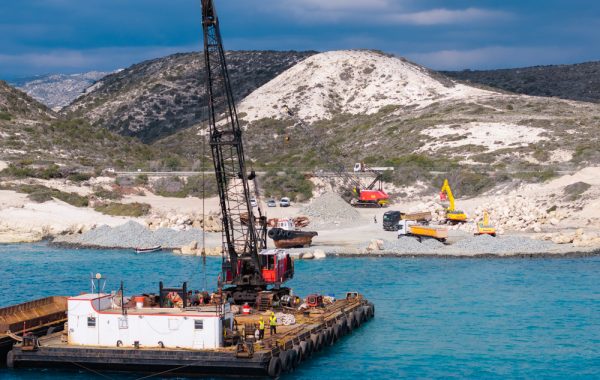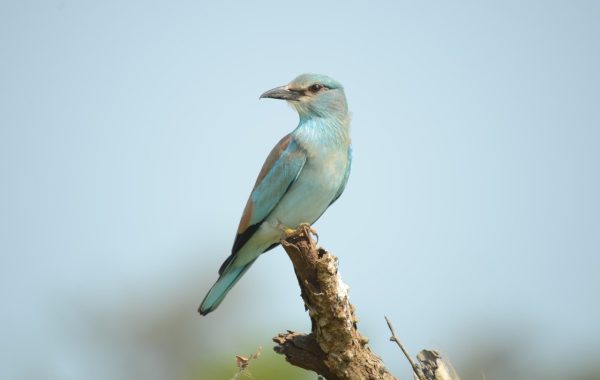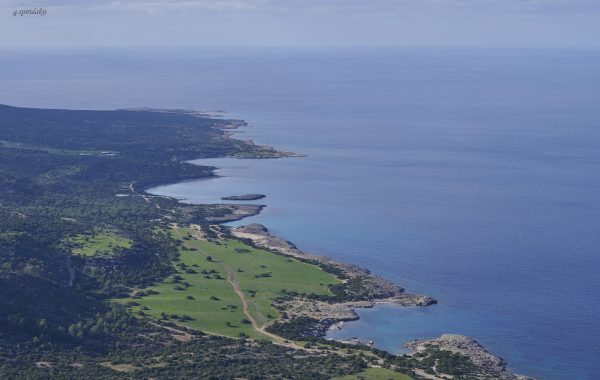How important is an Anti-Poison Dog Unit in the fight against poison use?
Victoria: Dog units are a very important and effective tool in the fight against poison use, not only because they help “sniff out” more incidents and rid the countryside of poison and prevent more deaths, they also allow us to gather more information to understand the extent of the problem as well as more evidence for prosecuting the offenders. But, in spite of their importance, dog units should not be considered the cure-all or a substitute for other absolutely necessary actions, such as the guarding of the countryside, legal prosecution, working to change the mentality of local communities and the political will necessary to tackle the issue of poison bait use.
Dimitris: Dog units are changing how we fight against poison baits. For the first time, we have in our hands an effective tool for investigating this wildlife crime. However, the findings alone of the dog units are not enough. Cooperation is necessary and the competent authorities should take advantage of these findings, in order to find and prosecute the perpetrators. So, we could say that dog units are the link that was missing from this crime-solving chain.


What was the situation in Greece before the dog units and how has it changed following their introduction?
Dimitris: Before the creation of the first dog units in 2014, and before the creation of the national working group, the problem of poison baits was ignored and the extent of the problem was unknown. When the first dog units started operating, solid evidence began to gather, backed up by toxicological tests, thereby documenting the problem. In areas where Anti-poison Dog Units are present, the number of reported / recorded cases is much higher than in other areas. This does not mean that other areas do not have poison baits; it simply means that poisoning incidents are either not found out or are not properly investigated. With their systematic and evidence-based work, dog units brought the problem of poison baits to the table. There are now 7 Anti-poison Dog Units operating in Greece and I expect more will be operating in the future.
Can you describe a typical day out in the field?
Dimitris: A typical day starts very early… Even more so in the summer months, when the dog cannot work after 9 am, due to high temperatures. If we are notified about a confirmed incident, we contact the competent authority and we try to go there together. When we arrive at the “suspicious site”, I initially do a site inspection to familiarize myself with the area, but also to detect any obvious evidence. Then, based on the already known victims / findings or elements of the topography of the site, I determine the area for the investigation. The way we move in space, however, is entirely up to Kouki; he is the one guided by smells… Oh, and we always take the wind into account! Before we start patrolling, there is a specific “dress code” for both of us. Hat, vest, gloves and backpack for me, and a harness for Kouki, so that he understands that now is time for work, not for a stroll. And this is how we set off for another “adventure”!
Victoria: In the case of Ioli, apart from the times when we are notified to go check out an incident, we follow a strict training program 2-3 times a week, where we set up a fake incident. For Ioli, the requirements are the same as they would be if it were a real incident. This helps Ioli keep fit and motivated.
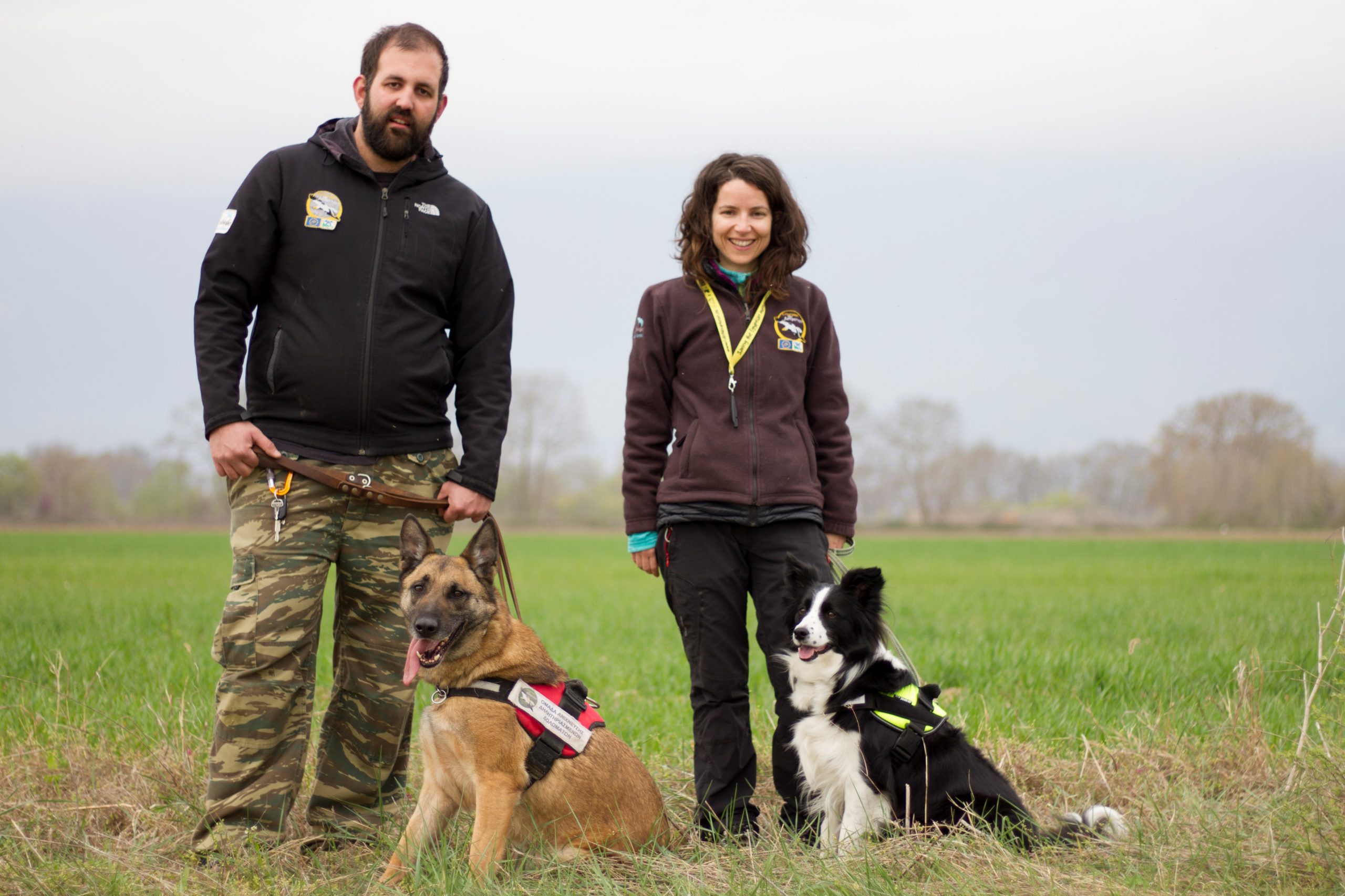
What are the steps followed when Kouki or Ioli find a poison bait or a poisoned animal in the countryside?
V., D.: The same procedure applies to both units. When Kouki finds something, he sits next to it to mark it. If it is a small bait, we collect it on the spot, after we take photos and note the location through GPS. We place the sample in a suitable container, handling it with extreme caution for safety concerns, as these are highly toxic substances. If there are dead insects around the bait, we collect them as well, because they can be a source of further poisoning for an insect-eating animal. If we find a poisoned animal or if the bait is a whole carcass, things get a little “complicated”. It must first be transferred to the rural veterinary clinic, in order to obtain appropriate samples for toxicological tests. Then the carcass must be buried in an appropriate manner as directed by the Ministry of Rural Development, so that it is not accessible to other animals and the death cycle is stopped there. Then samples are sent for tests, and a lawsuit and a pre-trial procedure is carried out by the competent authorities.
Any incidents that have stayed etched in memory?
Dimitris: To date I have investigated 47 poisoning incidents and remember them one by one. But no one forgets their first time. It was March 2014, and Kouki and I had just finished our training. I would say that Kouki was not very fond of me yet, probably because I was the reason that he got separated from his trainer. I received a call that there was a dead sheepdog close to Meteora. So, I loaded the car and we set off. This was the first time I was bringing Kouki to a real incident. We started with the dead dog that we knew was already there and continuing we found three more. At some point, I lost Kouki behind a bush. I walked to find him sitting next to a pile of meats! 8 kilos of poison bait! I will never forget that image! This was the patrol that sealed the creation of our team!
Victoria: Ioli has been fortunate enough and hasn’t had any major incidents with many dead animals so far. However, all incidents are very unpleasant and are unfortunately unforgettable, because one comes face to face with all the malice and cruelty of man.
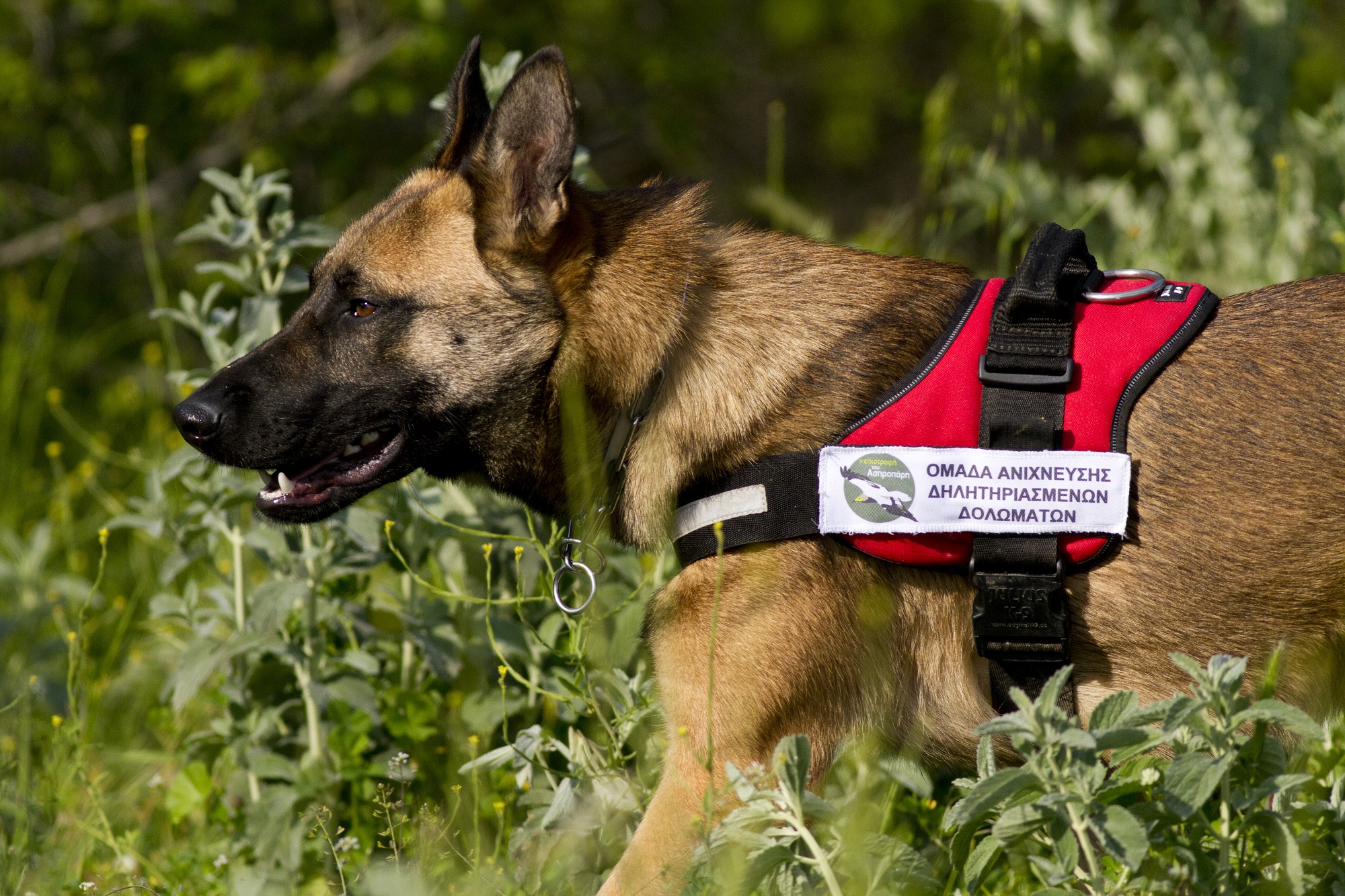
What has been the public’s and the countryside communities’ attitude towards dog units?
Dimitris: Since placement of poison baits is a practice that affects all of society and all land users, I can say that the public has embraced the dog units and shows trust in them. After so many years, where, for example, together with farmers we buried their poisoned sheepdogs, there is a relationship of mutual trust. Dog units offer a solution to a problem of society that did not exist until now! They bridge the gap between rural communities and conservationists.
Victoria: People usually are very impressed and are grateful for the help, emotional support and sympathy that we provide on a problem which, in most cases, no one pays attention to.
What is it like having a dog as a work partner?
Dimitris: It is a “love and passion” relationship, if I may call it that. In essence, it is like marrying the dog! You may have other friends, but he only has you. You are the leader of his herd! You should never lose this role, as he is a working dog with a very dangerous job. It is a full time relationship that requires dedication.
Victoria: It’s a unique experience, affecting your professional and your personal life, bringing everything upside down (but in a good way). Those afraid of commitment, had better avoid having such a partner!
What would you say to those placing poison baits in the countryside?
Dimitris: I usually say that the only one capable of destroying everything is the “two-legged beast”. To the two-legged beasts who place poison, I simply ask ‘WHY?’ and to their friends I remind them that silence is complicit!
Victoria: What can you possibly say to someone who does not respect life?
What advice would you give to a new handler, and perhaps the first one of a Cypriot Anti-Poison Dog Unit?
Dimitris: They need a strong stomach! They will see a lot of death, they will have to enter the perpetrator’s mind to investigate the incident, they will have to devote part of their soul. But, for every poison bait they will find, they will know that they have saved a life and this is a feeling only a few people can experience.


